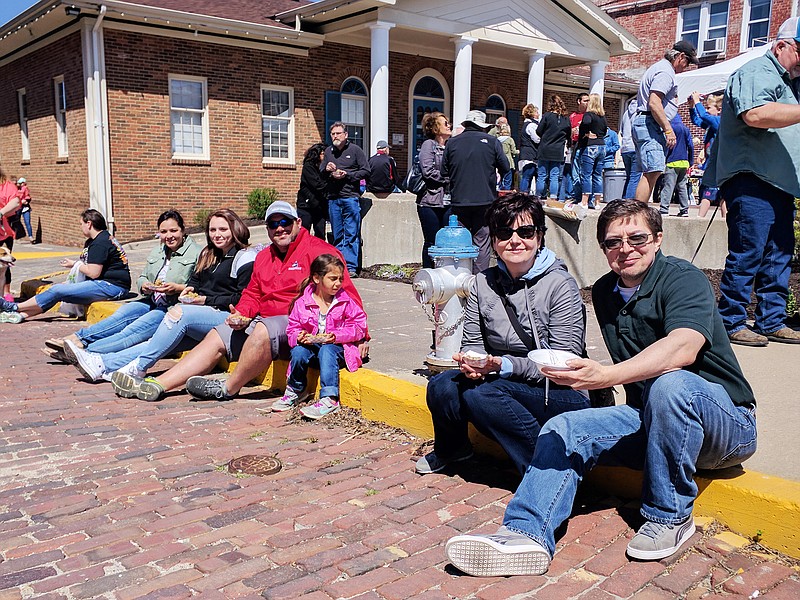It's a bumper crop year for morels - and that could mean the best Morels and Microwbrews yet.
The seventh annual Fulton festival dedicated to celebrating Missouri's finest fungi is scheduled 11 a.m.-4 p.m. Saturday.
"Preparation is going very well, better than any years past," said Garry Vaught, owner of Beks and the festival's head organizer. "We have more breweries than we've ever had, two wineries, one distillery. We have a few more food trucks available."
And the morels are flooding into Fulton by the day, he said.
"I'm going to pick up 200 pounds of fresh Missouri morels in the morning," Vaught said.
Nearly 1,000 pounds of morels will be available for purchase at the event. Fresh morels are going for $60 per pound (or $100 for 2 pounds). Fried morels cost $15 a basket; cream of morel soup is $5. A commemorative glass to sample the wares of the about 40 breweries will be $20.
After last year's supply chain problems led to morel shortages at the 2018 festival, Vaught has switched to a different morel provider, he said.
"We're using a gentleman out of Kansas," he said. "I bought from him two years ago, when we had the rain, and he sold me probably 150 pounds that year."
Craft vendors and food trucks have been rearranged this year to allow for better crowd flow, he added. There's live music, too - local favorites the Kay Brothers are opening at 11 a.m., followed by the Fried Crawdaddies at 1:30 p.m. Children can hunt mushrooms on the courthouse lawn at 1 p.m.
Festival regulars may remember last year's drama when Vaught's large wooden morel statue was stolen during the event, later turning up in a ditch. Precautions will be taken this year, he said.
"Because of lack of volunteers to have someone stand there all day. We do have a cardboard cutout of a (Buckingham Palace) guard, and we'll have it propped up right next to the statue, with a rope around it," he explained.
As of Monday, the National Weather Service was predicting a 20 percent chance of showers and thunderstorms for Saturday.
Go hunting
At $60 a pound, morels certainly command a premium. That's because these mushrooms have proven difficult to cultivate, unlike more-common grocery store varieties. They must be sought out in the woods.
They grow only during a brief window in Missouri, from late March to early May. They're also tricky to hunt, blending in with leaf litter and popping up unpredictably.
But if you want to try your hand, the Missouri Department of Conservation has some tips.
First, make sure you can identify morels. While morels are distinctive, the common stinkhorn (Phallus impudicus) and red false morels (Gyromitra genus) can fool beginners. Read up here for more information: nature.mdc.mo.gov/discover-nature/field-guide/morels.
Second, choose a date. Morels like daytime temperatures in the low 70s and nighttime temperatures in the 50s, and they crop up in abundance following rain. Don't fear the mud - if you wait for the ground to dry out, the morels may dry out too.
Third, pick your location. Most of Missouri's public lands allow for morel collection for personal use, but national parks are an exception. Don't pick on private property without permission.
Morels love to grow around elms, ashes, cottonwoods and apple trees; they also like to have a nearby water source. But sometimes they'll surprise you by popping up in an open field or a dense grove of cedars. Early in the season, they're most likely to show up on sun-warmed south- and west-facing slopes. Later on, look for them on north- and east-facing slopes and down in valleys.
According to the MDC, areas disturbed by flooding, fire or logging may produce bumper crops. However, other sources warn that floods may deposit pollutants and nasty bacteria that morels may pick up. Avoid picking in old apple orchards, because old pesticides contained heavy metals, which morels can concentrate.
Lastly, go out and try your luck. Make sure to hydrate well and use bug spray; mosquitoes and ticks are already out in force. Consider carrying your finds in a basket or mesh bag. This allows them to spread spores so there will be more morels next year.

